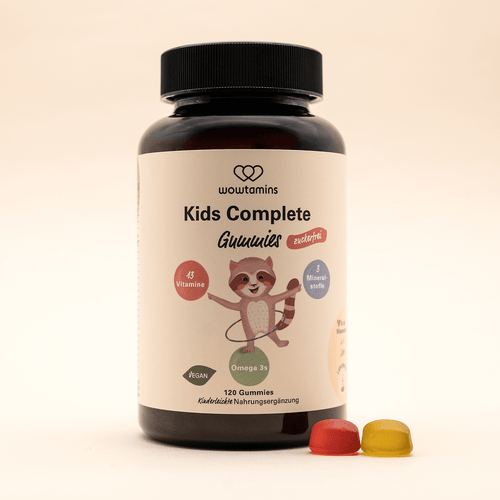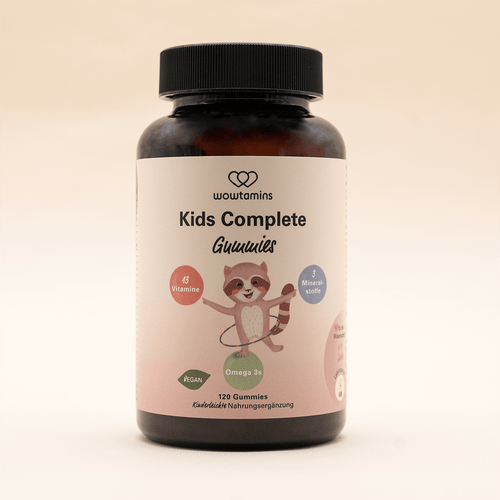Themen dieses Blogartikels:
Knowledge for your ears!
No time to read? Here you can listen to Claire's article.
Table of contents
- What is vitamin B12?
- What function does vitamin B12 have in the body?
- Vitamin B12 & blood formation
- Vitamin B12 & the nervous system
- How does a vitamin B12 deficiency occur and what are its effects?
- Sources of vitamin B12 in food
- What treatment options are there?
- Needs & Supply
- Can you overdose on vitamin B12?
- Tips for vegans
- Different forms of B12
- Sources & Bibliography
What is vitamin B12?
Vitamin B12, also known as cobalamin in technical terminology, is a water-soluble vitamin from the series of vitamin B complexes. The body cannot produce vitamin B12 itself. Therefore, the intake of the vitamin through food is the only way to supply it to the body. Finally, the intestinal mucosa plays a decisive role, because it is from here that the glycoprotein (also called instrinsic factor) formed in the gastric mucosa transports the vitamin into the body1.
Did you know that the body is able to store vitamin B12 in the liver for several years, the only vitamin capable of doing so1?
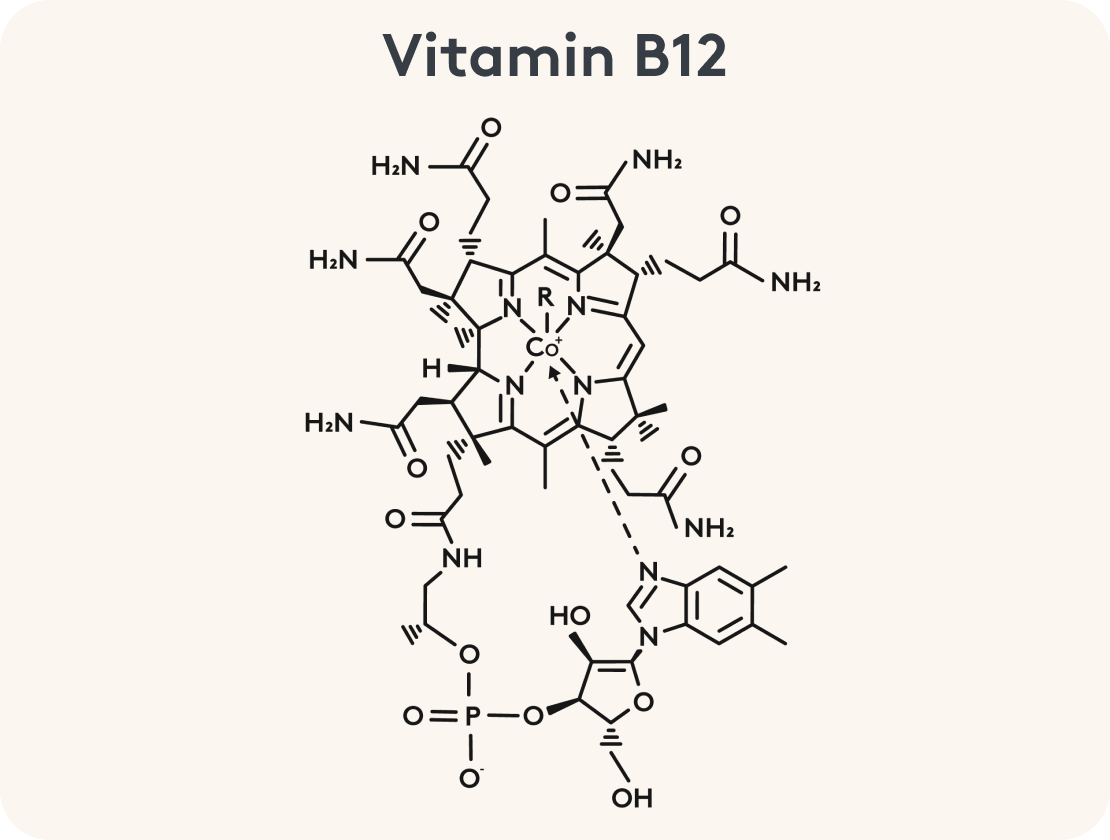

What function does vitamin B12 have in the body?
Vitamin B12 has many health-promoting functions in the body. Among other things, it is relevant for energy production, DNA repair and synthesis, and also for the central nervous system. One important function, together with other cofactors, is to reduce homocysteine levels in the body. Although homocysteine primarily supports the formation of other amino acids, elevated levels have adverse effects on the body and, in the worst case, can cause diseases such as Alzheimer's or venous thrombosis2.
Vitamin B12 also plays an important role in the formation of red blood cells (erythrocytes). Without sufficient vitamin B12, anemia, i.e., a lack of red blood cells, would occur. This leads, among other things, to a poorer oxygen supply to the target organs2.
Vitamin B12 & blood formation
Vitamin B12 also plays an important role in the formation of red blood cells (erythrocytes). Without sufficient vitamin B12, anemia, or a lack of red blood cells, would occur. This leads to symptoms such as fatigue , paleness, shortness of breath, and, in severe cases, dizziness or rapid heartbeat.³
Vitamin B12 also has a function in the cell division of other cells and is a cofactor of an enzyme that breaks down fatty acids.
Vitamin B12 & the nervous system
Vitamin B12 is essential for the regeneration and maintenance of the myelin sheath that surrounds the nerve fibers. This structure protects the nerves and enables signals to be transmitted efficiently. A deficiency can lead to symptoms such as tingling in the hands and feet, numbness or muscle weakness. In severe cases, it can lead to degeneration of the spinal cord, known as subacute combined degeneration.⁴ Adequate vitamin B levels can often fully or partially reverse such symptoms.⁵
How does a vitamin B12 deficiency occur and what is its effect?
Causes of a vitamin B12 deficiency
As is already known, the body can only absorb the vitamin in the form of food and this mainly through animal food sources. Vegetarians and vegans in particular must be careful here not to suffer from a deficiency and, if necessary, supplement by means of dietary supplements.
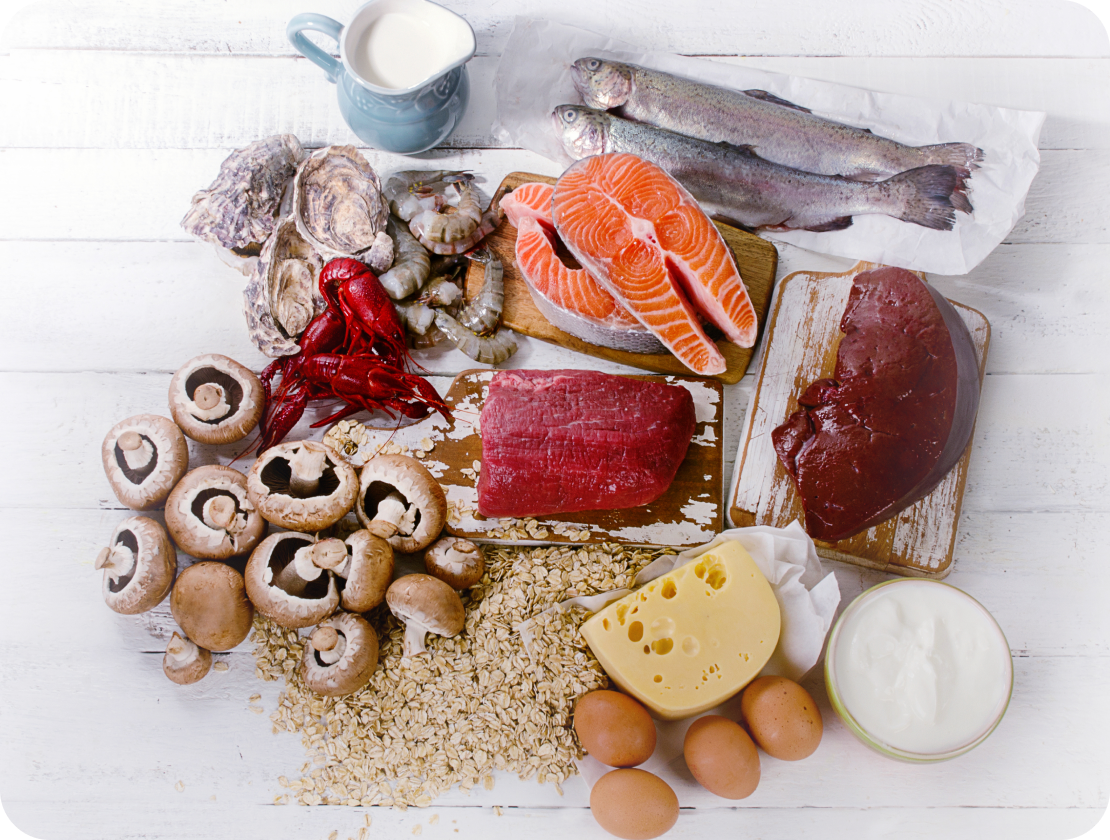

However, a purely plant-based diet is not the only reason for suffering from a vitamin B12 deficiency. Genetic changes or illnesses can also inhibit the absorption of the vitamin. This is the case, for example, if the gastric mucosal cells are damaged by gastritis and can therefore no longer produce the glycoprotein that is important for absorption. A similar effect can be caused by a gastric bypass.⁶ Intestinal diseases such as Crohn's disease also inhibit the absorption of the small intestine cells and are significantly involved in the development of deficiency symptoms.⁶
Vitamin B12 sources in food
Vitamin B12 is found almost exclusively in animal foods such as meat, fish, eggs, and dairy products.⁷ For people with a vegan diet, it is therefore especially important to use fortified products or supplements to meet their daily needs.⁷ Vegan sources include fortified foods such as plant milk or yeast extracts, as well as certain types of algae such as nori.⁷
The symptoms of a vitamin B12 deficiency
There are already a few mild symptoms that indicate a vitamin B12 deficiency. Symptoms of a vitamin B12 deficiency include difficulty concentrating, reduced memory, anaemia, tiredness and sometimes numbness in the fingers and toes.²
However, it does not mean that someone is suffering from a vitamin B12 deficiency just because they are tired more often for a certain period of time. For an accurate diagnosis, it is advisable to see a doctor and have a detailed blood count done.
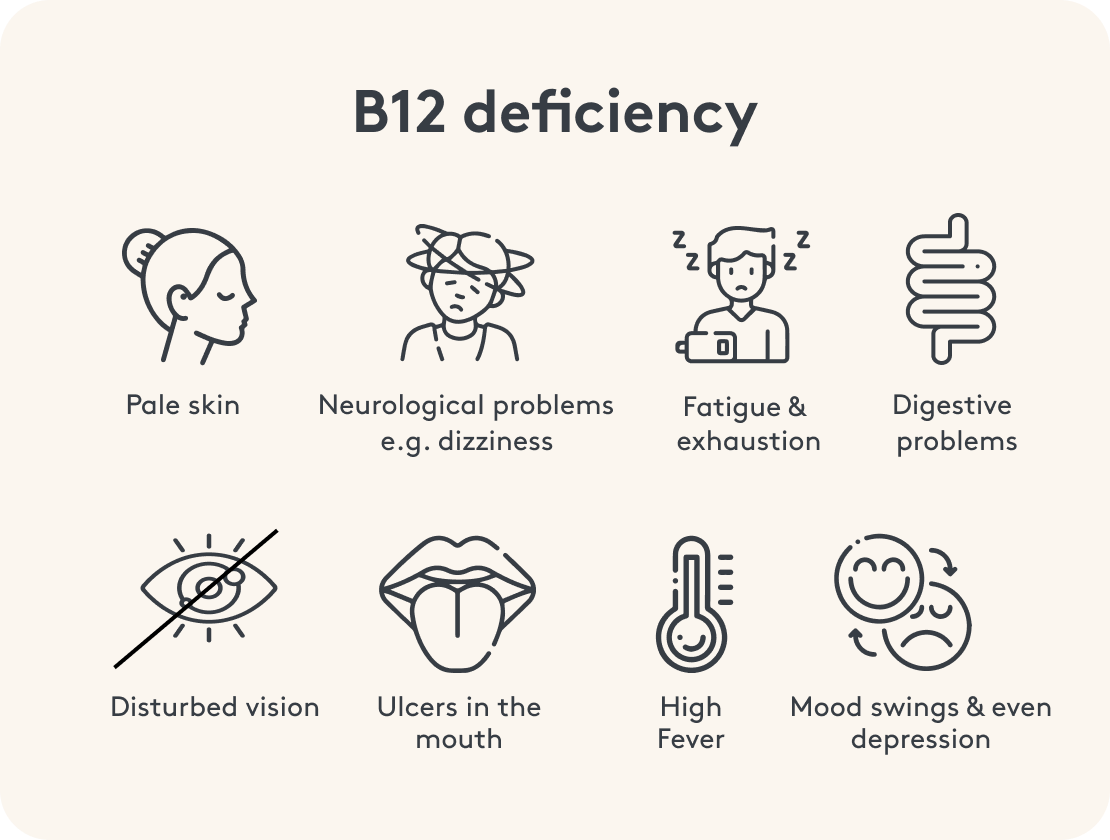

What treatment options are available?
Once the vitamin B12 store in the body is full, it takes between six and twelve months to empty.⁸ However, this makes it all the more important to regularly supply the body with vitamin B12.
As already mentioned, diet, illness or genetic changes can inhibit or even stop the absorption of the vitamin. Nevertheless, there are ways to supply the body with vitamin B12.
One of the best known and most commonly used measures is the intramuscular injection. The patient is injected with 1 mg of hydroxocobalamin three days a week for two weeks. After this two-week intensive treatment, the rhythm is reduced to every three weeks.⁹ However, the frequency and length of therapy can vary depending on the reason for treatment.
In addition to intramuscular injections, vitamin B12 can also be taken in the form of tablets or capsules. The daily intake of high-dose vitamin capsules has the same effect as the injections. The only difference is that the intramuscular injection works faster and is therefore more of an option for patients with severe deficiency symptoms or neurological symptoms.¹⁰ It also bypasses the digestive tract. The injections are particularly useful for people with inflammatory bowel disease or a gastric tube.
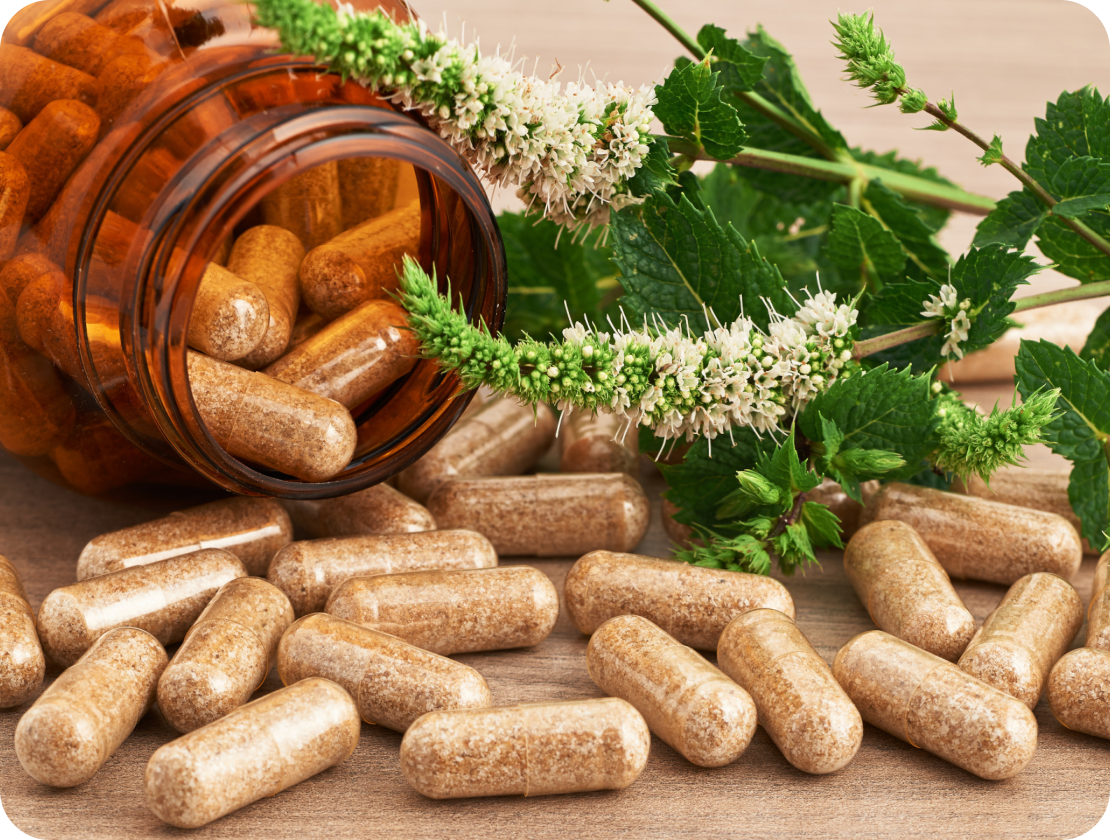
Is it possible to overdose on vitamin B12?
Absorption of vitamin B12
The absorption of vitamin B12 takes place in the small intestine and is supported by the so-called intrinsic factor, a protein that is formed in the stomach. Problems with the production of this factor can significantly impair absorption and increase the risk of deficiency.
Can you overdose on vitamin B12?
It's generally not possible to overdose on vitamin B12 in the body. A healthy body flushes out excess vitamins through the kidneys. However, elevated vitamin B12 levels can be a sign of liver and kidney disease. A doctor is best placed to determine this based on additional laboratory results.⁸
Tipps for vegans
As already mentioned, vegans are particularly affected by vitamin B12 deficiency as, unlike vegetarians, they also avoid dairy and egg products. In the USA, there are already foods fortified with vitamin B12, such as breakfast cereals. It is doubtful whether we can go that far here.
As even the vitamin B12 traces contained in fruit or vegetables do not cover the daily requirement of vitamins, it is advisable to help out with supplements.
Different forms of B12
Vitamin B12 exists in various biologically active forms, including methylcobalamin and adenosylcobalamin. These forms act as coenzymes in important metabolic processes. Methylcobalamin is involved in the conversion of homocysteine to methionine, while adenosylcobalamin plays a key role in fatty acid and amino acid metabolism.¹¹
There are four different permitted forms of cobalamin that can be used in supplements. These are partly synthetic and partly natural.
Cyanocobalamin: The synthetic form
Cyanocobalamin, abbreviated to CNCbl, is a synthetic form of vitamin B12. Due to its exceptional stability, it is a popular ingredient in dietary supplements and medications. However, cyanocobalamin does not occur naturally and must be artificially extracted. Even in the human body, it is only found in trace amounts in tissue.¹² Its bioactivity, or impact on your body, is therefore lower, as it must first be converted to be utilized.
Active & natural forms of vitamin B12
Methylcobalamin (MeCbl), adenosylcobalamin (AdoCbl), and hydroxocobalamin (HCbl) are among the naturally occurring forms and have long been a popular ingredient in dietary supplements. Some scientists advocate the long-term use of these natural substances in dietary supplements to prevent the formation of cyanide in human tissue, which can occur with the use of CNCbl.¹²
Furthermore, methylcobalamin and adenosylcobalamin are active forms that our body can use directly. They are therefore often considered the best forms for supplementation. Methylcobalamin plays a more important role in methyl and homocysteine metabolism, while adenosylcobalamin plays a more important role in fatty acid metabolism.
For the vitamin B12 contained in our products, we mainly use the natural forms methylcobalamin, adenosylcobalamin and hydroxocobalamin.
This article is based on carefully researched sources:
Sources & bibliography
- Vitamin B12 - Das sind die häufigsten Fragen. (2021, 31. März). Naturheilkunde.de
- Welche Funktionen haben B-Vitamine und Vitamin C? (o. D.).
- Beise, Uwe & Burkart, Andreas & Huber, Felix. (2016). Vitamin-B12-Mangel. PRAXIS. 105. 1331-1335. 10.1024/1661-8157/a002513.
- Baltrusch, Simone. (2021). The Role of Neurotropic B Vitamins in Nerve Regeneration. BioMed Research International. 2021. 1-9. 10.1155/2021/9968228.
- Badar A. Neuropsychiatric Disorders Associated With Vitamin B12 Deficiency: An Autobiographical Case Report. Cureus. 2022 Jan 21;14(1):e21476. doi: 10.7759/cureus.21476. PMID: 35223256; PMCID: PMC8858590.
- Obeid, R., Heil, S. G., Verhoeven, M. M. A., van den Heuvel, E. G. H. M., de Groot, L. C. P. G. M., & Eussen, S. J. P. M. (2019). Vitamin B12 Intake From Animal Foods, Biomarkers, and Health Aspects. Frontiers in nutrition, 6, 93.
- dge.de/gesunde-ernaehrung/faq/vitamin-b12/
- Romain, M., Sviri, S., Linton, D. M., Stav, I., & van Heerden, P. V. (2016). The role of Vitamin B12 in the critically ill--a review. Anaesthesia and intensive care, 44(4), 447–452.
- Shipton, M. J., & Thachil, J. (2015). Vitamin B12 deficiency - A 21st century perspective . Clinical medicine (London, England), 15(2), 145–150.
- Langan, R. C., & Goodbred, A. J. (2017). Vitamin B12 Deficiency: Recognition and Management. American family physician, 96(6), 384–389.
- PubMed. Biochemistry of B12-cofactors in human metabolism.
- Temova Rakuša, Ž., Roškar, R., Hickey, N., & Geremia, S. (2022). Vitamin B12 in Foods, Food Supplements, and Medicines-A Review of Its Role and Properties with a Focus on Its Stability. Molecules (Basel, Switzerland), 28(1), 240.
























